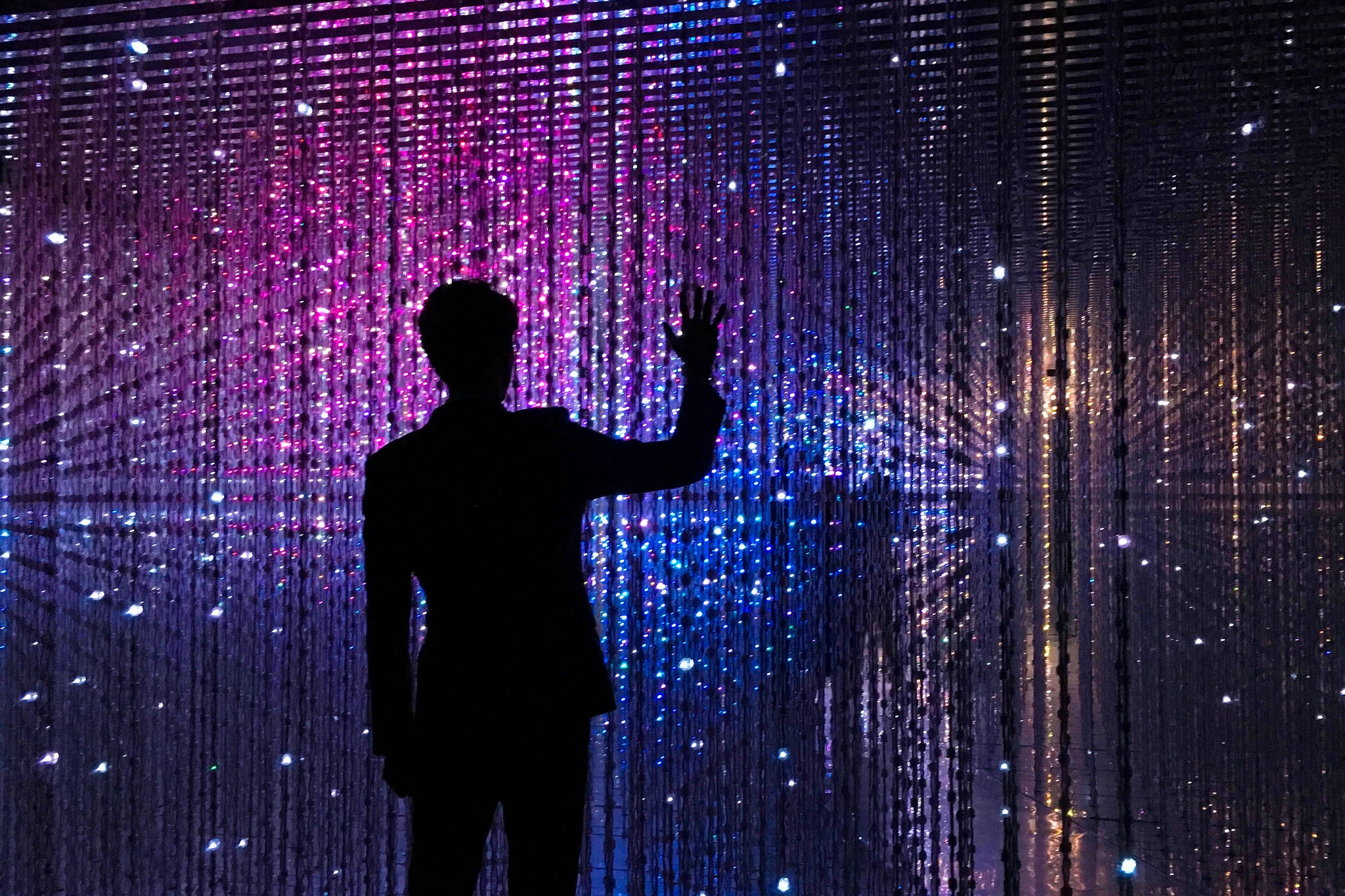EY refers to the global organization, and may refer to one or more, of the member firms of Ernst & Young Global Limited, each of which is a separate legal entity. Ernst & Young Global Limited, a UK company limited by guarantee, does not provide services to clients.

The convergence of physical and digital in the metaverse presents exciting opportunities but also critical challenges.
In brief
- We are on the precipice of a new technology epoch: the metaverse.
- As with previous paradigm shifts, the metaverse is poised to qualitatively transform every aspect of the human experience.
Every so often a new technology paradigm emerges, promising to fundamentally reengineer industries, economies, societies and daily life. Roughly 10 years since the last such shift — social, mobile, cloud — we may be on the cusp of a new one: the metaverse.
Touted as the successor to the internet, the metaverse refers to a shared, persistent, three-dimensional virtual realm where people interact with objects, the environment and each other through digital representations of themselves or avatars. A mainstay of science fiction novels for decades, the metaverse is not a new concept; early versions already exist, mainly in the gaming industry. However, with the COVID-19 pandemic accelerating the convergence of physical and digital, coupled with the evolution of complementary and emerging technologies, the metaverse seems poised to expand into every sphere of human activity.
Imagine hosting your meeting with colleagues hundreds of miles apart in the middle of the Colosseum ideating on a virtual whiteboard. Or instead of scrolling a website, walking through the aisles of a store, finding your best fit and having it delivered to your doorstep. Or simulating the optimal process manufacturing line to adjust for product variation and minimize bottlenecks, or testing an innovative aircraft wing design without building expensive prototypes.
These are just a few examples of how the metaverse may augment our capabilities, amplify our connections and enrich our interactions.
Undoubtedly, the concept is still in its infancy, but glimpses are emerging into what the metaverse may look like, how people will use it and the opportunities it will unleash. The challenge for businesses, governments and society at large is successfully navigating this next technology epoch, and usher in the next frontier of human experience.
From pixels to voxels: the future of every industry
The COVID-19 pandemic catalyzed the ongoing migration of our personal and professional lives into the world of pixels. However, while online platforms mediate many, if not all, our offline activities, they are unable to substitute physical presence. The metaverse proposes to bridge this gap; weaving together physical atoms and digital bits to construct a tactile, sensorially immersive experience that creates the feeling of being present without requiring actual presence. Effectively, it would allow us — including the places and things we value — to not just be on the internet but inside it.
Unconstrained from the physical limits of time and space, the metaverse presents transformational new opportunities across industries beyond gaming. Similar to the mobile internet era, the immersive era will demand a radical shift in companies’ approach to customer engagement, branding, product development, innovation and ultimately their entire business model. Already many are experimenting: leveraging existing gaming platforms to build virtual social spaces, selling virtual items like clothing or shoes for avatars, creating digital twins of factories to optimize operations, and even conducting interviews and onboarding new employees.
Governments are also taking note of the potential for deeper and richer interactions, including civil services, education, tourism and cultural events in the metaverse. Elsewhere embassies are being planned for smaller, less wealthy nations to have an instant international presence. And still others are using data-based digital replicas of physical environments coupled with artificial intelligence to predict the spread of wildfires and pre-emptively deploy firefighters.
These early forays provide a glimpse into the astonishing possibilities afforded by the metaverse. But alongside the benefits are potential pitfalls. Afterall, a full-fledged virtual immersive facsimile of our existing reality will surely duplicate many of the challenges we face in our physical and digital worlds — and doubtless, new ones will be created.
Besides the technology milestones required to fully realize the metaverse, there are perhaps more critical human-centric challenges that serve to temper the momentum and enthusiasm surrounding the concept. As the metaverse intersects with various facets of our physical and digital realities, five key questions emerge:
1. How will the metaverse unfold and transform enterprises?
While converging technologies are unlocking the path to the metaverse, fully connected 3D immersive experiences present a rich opportunity landscape across industries. Enterprises are asking themselves how they should think about the metaverse as they shape future strategy. What investments should they make today to be ready for the metaverse when it arrives?
Just as digital transformation continues to compel companies toward evolving every aspect of their business, similarly an immersive or metaverse transformation will be required. A new field of competitors will open up alongside new markets, new customer preferences and new business models. What new innovation models will emerge? What new skill sets will be required? How will it impact talent management?
Although the pervasive use of the metaverse as the main customer engagement interface is likely a few years away, enterprises need to start factoring it into their short-term and long-term vision today.
2. Are regulators ready for the metaverse?
Already regulators are grappling with managing the negative externalities of current digital technologies. Issues of personal data collection, privacy, deepfakes and more are significantly impacting the fabric of our society as well as how companies interact with their customers and employees. Very likely, the metaverse will magnify these challenges and introduce new ones.
In the near-term, our portal into the metaverse will be through virtual and augmented reality devices. Not only will they allow us to interact in the metaverse, but it will also allow companies to track increasingly personal data such as, facial expressions, blood pressure, eye gaze and more. Current laws and data regulations will need updating across multiple vectors ranging from equitable access to security, liability, IP and digital rights as well as new ones like honest self-representation. What would good and fair regulation look like and what will it take for regulators get ahead this time?
3. How will the metaverse reframe human-centered experiences?
Putting human interests at the core is an increasingly differentiating characteristic for enterprises today. In the metaverse, this will take on an entirely new meaning as individual personas will manifest and want to teleport across the virtual immersive landscape. Successful experiences in the metaverse will hinge on understanding and adapting to emerging customer behaviors and expectations. Moreover, as customers journey through the metaverse traversing many ecosystems, trust will become even more integral.
As the metaverse emerges in the future as the main technology interface, we also need to ask ourselves about the impact on potential technology addiction and mental health. Concerns already exist across these same topics for the current generation of social media technologies and the metaverse will make that experience even more engaging and potentially more dangerous.
So, in this context, how will this change the way brands design and implement the customer journey? What will it take to deliver truly trusted experiences? And how will customer engagement and loyalty be redefined?
4. What new dimensions will the metaverse open for sustainability?
Perhaps the greatest existential threat to humanity, sustainability is high on corporate and government agendas. What role does the metaverse play in our collective effort to tackle this global issue?
Making the metaverse a technology reality will require a vast new infrastructure and to be embraced it will necessitate resilient, net zero solutions. Moreover, if product and experience consumption shift disproportionately to virtual or digital, it could significantly impact physical resource consumption and greenhouse gas emissions and that can be in a positive way as it could potentially lead to less travel but also potentially increasing the demands on the power grid.
If the metaverse makes us value the virtual and digital world more than the physical, will it move us to care less about the environment? On the other hand, the metaverse could transform our ability to observe, model and act in the physical world, leading us to better understand our environmental impact and make better decisions.
5. How will implementations of the metaverse develop around the world?
The internet is already balkanized, operating under different rules in different parts of the world. Indeed, technology is becoming the new basis for global competition and the metaverse will not be spared. While globally recognized standards will surely emerge to enable interoperability, sovereign governments will likely intervene as they have done in today’s internet world.
How will global geopolitics and rising trend of protectionism impact the evolution of the metaverse? Will similar fault lines appear? And what will it mean for businesses that are increasingly multinational thanks to the nature of the internet itself?
The decentralization movement is at its core an attempt at collective governance without sovereign or corporate regulations. As it gains traction in the metaverse with blockchain-based mechanisms for exchange, will it become the defining economic paradigm? What implications might such a shift have on the future of business models and corporate structures?
Complexities and challenges of a new reality
At the threshold of any new technology wave there are competing visions of dystopia and utopia; the metaverse is no different. While we cannot fully imagine the entire gamut of benefits or risks that will emerge, it is clear that we are about to launch into a fascinating new dimension of the human experience. This is the first in a series of deep dives that EY proposes to undertake. In subsequent articles we will delve further into the critical questions posed above in the hope of revealing actionable and practical strategies for enterprises, governments, economies and individuals.
How EY can help
-
Discover how EY's digital transformation teams can help your business evolve quickly to seize opportunities and mitigate risks. Find out more.
Read more
Summary
We are seemingly at the brink of a breakthrough disruption: the metaverse. As the next frontier of the human experience, the metaverse will demand an entirely new approach to every sphere of human activity. Businesses, governments and society at large will need to understand the impact and implications for a broad range of stakeholders and design accordingly.



